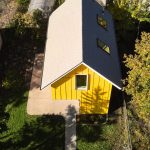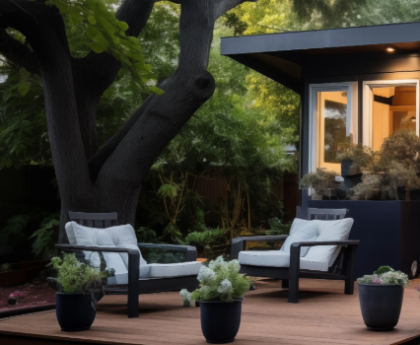
This is the fifth installment in Target 12’s weeklong Housing Crisis series.
JOHNSTON, R.I. (WPRI) — After Marianne Kelly retired in 2021, her daughter and son-in-law were planning for a second child and they asked her to move in with them.
“At first I said, ‘Absolutely not,’” Kelly told Target 12. “I didn’t really think I’d ever live with my kids.”
But Kelly eventually changed her mind and they all moved into a Johnston home, which has a smaller, adjoining space for Kelly next to the main section of the house where her daughter’s family lives. Kelly’s space is outfitted with a bedroom, small living room, bathroom and kitchen.
“It’s been a blessing,” said Kelly, who lives on a fixed income and estimates she’s cut her living expenses by a third. The savings allowed her to retire three years earlier than planned, she said.
Kelly lives in what’s technically known as an “accessory dwelling unit,” or ADU, which is sometimes known colloquially as an in-law apartment or a granny flat. And Rhode Island leaders are mulling whether to change state law to allow many more people to live in one.
As lawmakers debate ways to address the state’s worsening housing crisis, House Speaker Joe Shekarchi sees expanding ADUs as one potential solution, especially as the Rhode Island population gets older.
U.S. Census Bureau data shows the portion of Rhode Islanders who are 65 years or older increased from 14.4% in 2010 to 18.2% in 2020. Younger age groups, meanwhile, saw declines.
“ADUs are the number one priority for seniors,” Shekarchi, D-Warwick, said on Newsmakers in January.
The speaker is championing a bill sponsored by state Rep. June Speakman that would ease restrictions on ADUs. The units could now be rented out to anyone, whereas under current law, only a family member can live in one.
“The fear of the ADU is a fear of the in-law apartment — that’s all it is,” Shekarchi said, although he acknowledged the units could be turned into regular rentals. However, they wouldn’t be allowed to be turned into short-term rentals for platforms like Airbnb and VRBO.
The bill has been strongly endorsed by AARP, a nonprofit that advocates for people over 50, which released a survey showing 87% of older Rhode Islanders want to receive care from loved ones at home with caregiver assistance.
But AARP also highlighted a ranking that put Rhode Island last in the country for housing for older adults. The state ranked 43rd for home care costs and 41st for home health aide supply.
“Rhode Island’s dismal ranking for housing older adults — dead last in the country — points to the urgent need to increase the supply of affordable, accessible housing,” AARP Rhode Island state director Catherine Taylor wrote in support of expanding ADUs.
“Expanding housing units for older Rhode Islanders cannot wait,” added Taylor, a former candidate for lieutenant governor.
Yet the idea of homeowners suddenly being allowed to build additional dwellings on their properties and rent them out to anybody isn’t getting praise from all quarters.
As Target 12 first reported last year, several East Providence residents expressed frustration after Mayor Bob DaSilva built a two-story structure behind his house that they argued looks just like a second home.
DaSilva initially described the house as a “garden shed” on permits, but he later acknowledged that he’d like to turn it into an ADU if the legislation becomes law.
“The intent of it is really to be a garden shed, but there will be a bathroom in it,” DaSilva said in November. “And we designed it in such a way that if in the future, if something should be changed in the law at the state level, or something else, we can convert it into an ADU.”
The ADU bill has already passed the House for the second year in a row, but it remains unclear whether it will win support in the Senate, which declined to pass it last year. State Sen. Victoria Gu, a Charlestown Democrat, has introduced an ADU bill in her chamber.
“ADUs are a solution to the housing crisis in the short term because you can convert, say, a garage or, say, a part of your house much faster than you can for new construction,” Gu said.
Senate Majority Leader Ryan Pearson, a Cumberland Democrat, has suggested there could be room for a compromise on ADUs this year.
“Senators had concerns around the language in the bill where it allows basically by right to create ADUs,” Pearson said last month on The Public’s Radio. “I would imagine through some amendments to it we can find a path and we’re committed to working with the speaker to find a way forward.”
Concern about people being allowed to build the structures by right has been echoed on the local level. Steven Frias, a member of the Cranston City Planning Commission, warned homeowners could easily use the proposed law to turn single-family neighborhoods into rental communities and disappear.
“When you have absentee landlords, you’ll see it,” said Frias, who also serves as Rhode Island’s Republican national committeeman. “Sometimes the property goes into disrepair, sometimes the residents can cause noise issues for the neighbors.”
“If zoning is really the enemy, then why is it here?” he added. “Why has it been around for a century, and all over the country?”
There’s reason to believe the legislation could significantly expand units in Rhode Island. California lawmakers relaxed building restrictions around ADUs in 2019. A year later, ADU production tripled. In 2022, ADUs accounted for about 19% of all new housing permits in the state.
Rhode Island only permitted an average of 58 ADUs a year in 2021 and 2022, according to Housing Secretary Stefan Pryor, and only an average of 38 received a certificate of occupancy. That represents less than 5% of the roughly 1,400 new units in Rhode Island during each of those years reported by the U.S. Department of Housing and Urban Development.
“ADUs offer promising options not only for supporting family members but also for generating rental income which can be helpful in enabling more Rhode Islanders to remain in their homes,” Pryor argued in testimony submitted in support of the legislation.
“ADUs can also be particularly helpful in fostering new units in areas with limited developable parcels and in boosting units without the need for significant new infrastructure investments,” he added.
Rhode Island built fewer new housing units per capita than anywhere else in the country last year, according to HUD data.
For Kelly in Johnston, who is an AARP volunteer, expanding ADUs is one potential way to change that trend, and provide more options for older Rhode Islanders to live.
“We have a way to solve this crisis or at least address this crisis,” she said. “It’s just so important.”
Kate Wilkinson ([email protected]) is a Target 12 investigative reporter for 12 News. Connect with her on Twitter and Facebook.
Eli Sherman ([email protected]) is a Target 12 investigative reporter for 12 News. Connect with him on Twitter and on Facebook.




